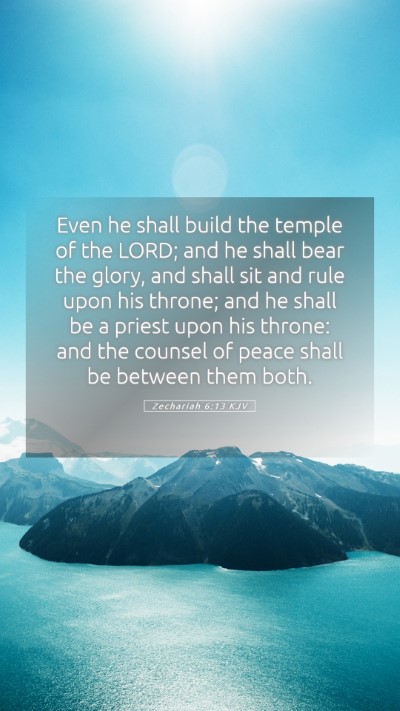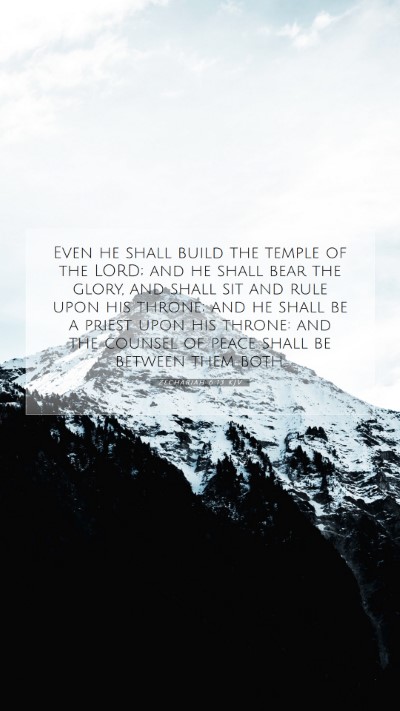Old Testament
Genesis Exodus Leviticus Numbers Deuteronomy Joshua Judges Ruth 1 Samuel 2 Samuel 1 Kings 2 Kings 1 Chronicles 2 Chronicles Ezra Nehemiah Esther Job Psalms Proverbs Ecclesiastes Song of Solomon Isaiah Jeremiah Lamentations Ezekiel Daniel Hosea Joel Amos Obadiah Jonah Micah Nahum Habakkuk Zephaniah Haggai Zechariah MalachiZechariah 6:13 Meaning
What is the meaning of Zechariah 6:13?
Even he shall build the temple of the LORD; and he shall bear the glory, and shall sit and rule upon his throne; and he shall be a priest upon his throne: and the counsel of peace shall be between them both.
Zechariah 6:13 Bible Verse Meaning
Understanding Zechariah 6:13: A Comprehensive Bible Verse Commentary
Zechariah 6:13 states: "Even he shall build the temple of the Lord; and he shall bear the glory, and shall sit and rule upon his throne; and he shall be a priest upon his throne: and the counsel of peace shall be between them both."
This verse is profound, encapsulating multiple themes within the context of Old Testament prophecy and messianic expectation. Here, we will delve deep into its meanings, using insights from public domain commentaries including those of Matthew Henry, Albert Barnes, and Adam Clarke.
Verse Context and Summary
Zechariah, a post-exilic prophet, conveys messages of hope and restoration for the Jewish exiles returning from Babylon. The prophetic visions he presents contain rich symbolism concerning the coming of the Messiah and the establishment of God’s kingdom. At the heart of Zechariah 6:13 lies the declaration of a future leader who would emerge as both a king and a priest—a dual role that foreshadows the coming of Jesus Christ.
Bible Verse Meaning
- Dual Role of the Messiah: According to Matthew Henry, this verse highlights the unique position that the anticipated figure—it signifies the Messianic office that combines governance and priesthood. Unlike any earthly leader, this prophesied person would embody both spiritual and temporal authority.
- Building the Temple: Albert Barnes explains that the reference to "building the temple" indicates a restoration of the worship of God, symbolizing not merely a physical structure but also a spiritual revival, where God's presence is once again among His people.
- Glory and Kingship: The phrase “he shall bear the glory” signifies that this leader will not only restore the temple but will also bring the magnificence of God's glory back into the lives of the people. As per Adam Clarke, this emphasizes the supreme honor and dignity associated with the Messiah.
- Counsel of Peace: The “counsel of peace” suggests a harmonious relationship between the king's sovereignty and the priestly intercession. Matthew Henry notes that this peace is essential for the unity of worship and governance.
In-Depth Interpretation
This verse can be seen as a powerful endorsement of the Messianic hope present throughout the Old Testament. Each element provides a glimpse into the nature of Jesus' future ministry:
- Prophetic Significance: This verse signifies God's promise to restore Israel and hints at a spiritual renewal that would come through Jesus Christ, who would fulfill these roles completely.
- Theological Implications: The duality of king and priest underlines the Christian understanding of Jesus as our High Priest (Hebrews 4:14) and King (Revelation 19:16), who mediates peace between God and humanity.
- Historical Context: During Zechariah's time, the exiles were discouraged. The hope of a glorious temple and a righteous leader instilled motivation for rebuilding and spiritual cultivation among the returning exiles.
Practical Applications
Applying Zechariah 6:13 to Daily Life:
- Emphasizing the importance of both spiritual growth (temple building) and societal leadership.
- Recognizing the significance of Jesus Christ’s dual role in personal worship and governance within the community.
- Promoting unity and peace among believers, reminiscent of the "counsel of peace" that should characterize our relationships.
Cross References
To deepen the understanding of Zechariah 6:13, consider the following related verses:
- Hebrews 7:14-17: Discusses Christ's priesthood in the order of Melchizedek, another prophetic foreshadowing.
- Psalm 110:4: References the priestly role of the Messiah.
- Zachariah 3:8-10: Discusses Joshua the high priest and God's promise of His servant, the Branch.
Conclusion
Zechariah 6:13 serves as a remarkable bridge between the Old Testament prophecies and their culmination in the New Testament through Jesus Christ. By understanding this scripture as both a historical promise and a living reality, believers can draw profound insights into both the nature of God’s kingdom and the role of Christ in our lives.


